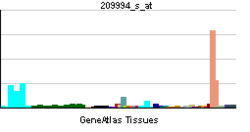ABCB4
| View/Edit Human | View/Edit Mouse |
Multidrug resistance protein 3 is a protein that in humans is encoded by the ABCB4 gene.[3][4][5] ABCB4 is associated with progressive familial intrahepatic cholestasis type 3.
The membrane-associated protein encoded by this gene is a member of the superfamily of ATP-binding cassette (ABC) transporters. ABC proteins transport various molecules across extra- and intra-cellular membranes. ABC genes are divided into seven distinct subfamilies (ABC1, MDR/TAP, MRP, ALD, OABP, GCN20, White). This protein is a member of the MDR/TAP subfamily. Members of the MDR/TAP subfamily are involved in multidrug resistance as well as antigen presentation. This gene encodes a full transporter and member of the p-glycoprotein family of membrane proteins with phosphatidylcholine as its substrate (flippase activity). The function of this protein has not yet been determined; however, it may involve transport of phospholipids from liver hepatocytes into bile. Alternative splicing of this gene results in several products of undetermined function.[5]
References
- ↑ "Human PubMed Reference:".
- ↑ "Mouse PubMed Reference:".
- ↑ Van der Bliek AM, Baas F, Ten Houte de Lange T, Kooiman PM, Van der Velde-Koerts T, Borst P (Mar 1988). "The human mdr3 gene encodes a novel P-glycoprotein homologue and gives rise to alternatively spliced mRNAs in liver". The EMBO Journal. 6 (11): 3325–31. PMC 553787
 . PMID 2892668.
. PMID 2892668. - ↑ Rosmorduc O, Hermelin B, Poupon R (Apr 2001). "MDR3 gene defect in adults with symptomatic intrahepatic and gallbladder cholesterol cholelithiasis". Gastroenterology. 120 (6): 1459–67. doi:10.1053/gast.2001.23947. PMID 11313316.
- 1 2 "Entrez Gene: ABCB4 ATP-binding cassette, sub-family B (MDR/TAP), member 4".
Further reading
- Rosmorduc O, Poupon R (2007). "Low phospholipid associated cholelithiasis: association with mutation in the MDR3/ABCB4 gene.". Orphanet journal of rare diseases. 2: 29. doi:10.1186/1750-1172-2-29. PMC 1910597
 . PMID 17562004.
. PMID 17562004. - Mbongo-Kama E, Harnois F, Mennecier D, et al. (2007). "MDR3 mutations associated with intrahepatic and gallbladder cholesterol cholelithiasis: an update.". Annals of Hepatology. 6 (3): 143–9. PMID 17786139.
- Lincke CR, Smit JJ, van der Velde-Koerts T, Borst P (1991). "Structure of the human MDR3 gene and physical mapping of the human MDR locus.". J. Biol. Chem. 266 (8): 5303–10. PMID 2002063.
- van der Bliek AM, Kooiman PM, Schneider C, Borst P (1989). "Sequence of mdr3 cDNA encoding a human P-glycoprotein.". Gene. 71 (2): 401–11. doi:10.1016/0378-1119(88)90057-1. PMID 2906314.
- Callen DF, Baker E, Simmers RN, et al. (1987). "Localization of the human multiple drug resistance gene, MDR1, to 7q21.1.". Hum. Genet. 77 (2): 142–4. doi:10.1007/BF00272381. PMID 3477522.
- Smit JJ, Schinkel AH, Mol CA, et al. (1994). "Tissue distribution of the human MDR3 P-glycoprotein.". Lab. Invest. 71 (5): 638–49. PMID 7734012.
- Smit JJ, Mol CA, van Deemter L, et al. (1995). "Characterization of the promoter region of the human MDR3 P-glycoprotein gene.". Biochim. Biophys. Acta. 1261 (1): 44–56. doi:10.1016/0167-4781(94)00214-n. PMID 7893760.
- Whitington PF, Freese DK, Alonso EM, et al. (1994). "Clinical and biochemical findings in progressive familial intrahepatic cholestasis.". J. Pediatr. Gastroenterol. Nutr. 18 (2): 134–41. doi:10.1097/00005176-199402000-00003. PMID 7912266.
- Ruetz S, Gros P (1994). "Phosphatidylcholine translocase: a physiological role for the mdr2 gene.". Cell. 77 (7): 1071–81. doi:10.1016/0092-8674(94)90446-4. PMID 7912658.
- Smit JJ, Schinkel AH, Oude Elferink RP, et al. (1993). "Homozygous disruption of the murine mdr2 P-glycoprotein gene leads to a complete absence of phospholipid from bile and to liver disease.". Cell. 75 (3): 451–62. doi:10.1016/0092-8674(93)90380-9. PMID 8106172.
- van Helvoort A, Smith AJ, Sprong H, et al. (1996). "MDR1 P-glycoprotein is a lipid translocase of broad specificity, while MDR3 P-glycoprotein specifically translocates phosphatidylcholine.". Cell. 87 (3): 507–17. doi:10.1016/S0092-8674(00)81370-7. PMID 8898203.
- de Vree JM, Jacquemin E, Sturm E, et al. (1998). "Mutations in the MDR3 gene cause progressive familial intrahepatic cholestasis.". Proceedings of the National Academy of Sciences of the United States of America. 95 (1): 282–7. doi:10.1073/pnas.95.1.282. PMC 18201
 . PMID 9419367.
. PMID 9419367. - Malorni W, Lucia MB, Rainaldi G, et al. (1998). "Intracellular expression of P-170 glycoprotein in peripheral blood mononuclear cell subsets from healthy donors and HIV-infected patients.". Haematologica. 83 (1): 13–20. PMID 9542318.
- Jacquemin E, Cresteil D, Manouvrier S, et al. (1999). "Heterozygous non-sense mutation of the MDR3 gene in familial intrahepatic cholestasis of pregnancy.". Lancet. 353 (9148): 210–1. doi:10.1016/S0140-6736(05)77221-4. PMID 9923886.
- Dixon PH, Weerasekera N, Linton KJ, et al. (2000). "Heterozygous MDR3 missense mutation associated with intrahepatic cholestasis of pregnancy: evidence for a defect in protein trafficking.". Hum. Mol. Genet. 9 (8): 1209–17. doi:10.1093/hmg/9.8.1209. PMID 10767346.
- Jacquemin E (2002). "Role of multidrug resistance 3 deficiency in pediatric and adult liver disease: one gene for three diseases.". Semin. Liver Dis. 21 (4): 551–62. doi:10.1055/s-2001-19033. PMID 11745043.
- Eloranta ML, Heiskanen JT, Hiltunen MJ, et al. (2003). "Multidrug resistance 3 gene mutation 1712delT and estrogen receptor alpha gene polymorphisms in Finnish women with obstetric cholestasis.". Eur. J. Obstet. Gynecol. Reprod. Biol. 104 (2): 109–12. doi:10.1016/S0301-2115(02)00064-7. PMID 12206920.
- Eloranta ML, Heiskanen JT, Hiltunen MJ, et al. (2003). "Multidrug resistance 3 gene mutation 1712delT and estrogen receptor alpha gene polymorphisms in Finnish women with obstetric cholestasis.". Eur. J. Obstet. Gynecol. Reprod. Biol. 105 (2): 132–5. doi:10.1016/s0301-2115(02)00160-4. PMID 12381474.
External links
- ABCB4 protein, human at the US National Library of Medicine Medical Subject Headings (MeSH)
- ABCB4 human gene location in the UCSC Genome Browser.
- ABCB4 human gene details in the UCSC Genome Browser.

